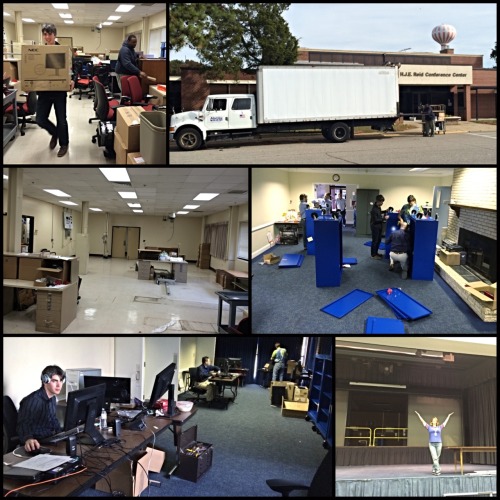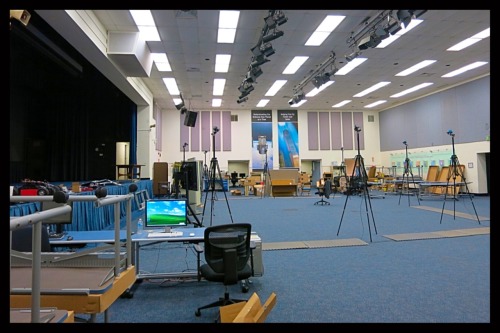Wednesday, November 4th, marked the one year anniversary of our team’s move to B1222, also known as the Old Reid Center.

Since our move, the Autonomy Incubator has hosted over 35 student interns, given more than 50 tours (to center directors, the NASA Deputy Administrator, OMB, OSTP - just to name a few!), and brought in close to 20 outside speakers to share their work with the Center. The facility itself measure over 70,000 cubic feet, and the forest, mars landscape and residential zone all help our researchers accurately develop autonomous capabilities.

 |
| Our first week in B1222 |
 |
| A young visitor navigates a UAV using Meghan Chandarana's developments with gesture-based controls. |
The large auditorium space enables us to test and demonstrate our algorithms. A fan favorite, Dr. Loc Tran's tree-dodging demo highlights our work with machine learning and with obstacle detection and avoidance.
In the past year, the Autonomy Incubator has worked on a variety of projects. We host student interns who lead their own research, such as Bilal Mehdi and Javier Puig-Navarro's work on coordinated trajectories for small and micro UAS, and we also continuously adapt to reflect research improvements and industry needs. You can read more about our most recent projects here.
 |
| A UAV autonomously navigates through our forest. |
 |
| James Rosenthal and Jim Neilan set up our rover and "Green Machine" UAV for a demo. |
 |
| An overhead view of our auditorium a year after our move. From right to left: our residential area, forest, and the Mars landscape. |
We are also pleased to announce that the Autonomy Incubator has received a project extension and expansion in name. As the need for autonomous capabilities becomes more apparent, NASA is transitioning our team name from “Autonomy Incubator” to “Langley Autonomy and Robotics Center” although we will never stop incubating new and innovative missions!
An increasing number of projects at NASA Langley Research Center require the development of autonomous capabilities to ensure mission success, and we're looking forward to working with a variety of different teams on site. As we work to maximize our interaction with other groups at Langley, our past month’s showcase became an experiment in internal communications. We received a record number of NASA visitors due to heightened publicity for the event, and we left the showcase with a stronger connection to our audience and with their work.
As we reflect on all that has been accomplished in the past year, we also look towards developing autonomous capabilities to meet the future challenges that NASA will encounter in missions in space, science, and aeronautics. To stay up-to-date with the projects we're working on, follow us on social media.
Twitter: @AutonomyIncub8r
Instagram: @AutonomyIncubator
No comments:
Post a Comment